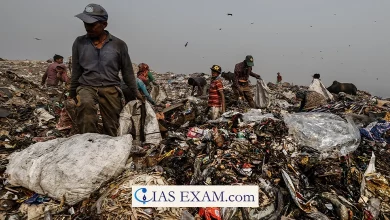
Context- The Union Health Minister recently said that India’s “bioeconomy” has grown eightfold in the last eight years, from $10 billion to $80 billion.
About
- Speaking at the Pre Vibrant Gujarat seminar on ‘Biotechnology: Viksit Bharat’s Path to Innovation and Prosperity’, the minister emphasized that bio-agriculture and bio-pharmaceuticals and bio-services are emerging sectors that are growing rapidly in the country.
From bioeconomy
- Bioeconomy refers to the use of renewable biological resources and processes to create value and products in various sectors.
- This includes activities such as:
- Bio-based production: for example, biofuels from algae, bioplastics from corn starch and enzymes from bacteria.
- Biotechnology: Examples include genetic engineering, bioremediation and vaccine development.
- Circular bioeconomy: This includes practices such as composting, recycling biomaterials and using waste to generate energy.
Related challenges
- Technical infrastructure: Limited availability of advanced research facilities, skilled labor and testing platforms hinders innovation and commercialization.
- Policy and regulatory framework: Lack of clear policies for bio-based products such as genetically modified organisms (GMOs) and intellectual property rights creates uncertainty for investors and entrepreneurs.
- Market Competitiveness: The established fossil fuel and petrochemical industries compete. Investments: Bio-based products often require higher initial investments and may face price pressures.
- Social Acceptance: Concerns about the ethical aspects of biotechnology must be addressed.
Suggestions
- Policy and Regulatory Framework: Explore the uncertainties surrounding bio-based products such as GMOs.
- Private sector engagement: Indian companies must invest in bio-based technologies and products and create a vibrant ecosystem for innovation and collaboration.
- Research and Development: Increase government and private sector investment in research and development of advanced biotechnologies and applications.
- Promote collaboration between research institutes, industry players and start-ups.
- Prioritize research into second generation biofuels, bioremediation technologies and circular bioeconomy solutions.
- Vocational skills and education: Universities and research institutes must focus on educational programs related to the bioeconomy and create a future workforce.
- Availability and sustainability of raw materials: promote sustainable agricultural practices and crop diversification to ensure reliable availability of raw materials.
- Financial incentives: Provide targeted grants, subsidies and tax incentives to the bio-based industry and facilitate access to affordable financing for the development of bio-based products.
Government initiatives:
- The Government of India has launched several programs and policies to support the bioeconomy, including
- National Bioeconomy Mission: Launched in 2021, the ambitious program aims to achieve a bioeconomy of $150 billion by 2025.
- It focuses on five main areas:
- Bio-based production
- Biotechnology
- Bioresources and agriculture
- Bio Infrastructure and information management
- Create a supportive regulatory environment
- Biofuels Policy (2018): This is a major initiative by the Government of India to promote the use of biofuels and reduce dependence on fossil fuels.
- The policy calls for a gradual increase in the blending percentage of ethanol in gasoline and biodiesel in diesel. Currently, the goal is to reach a 20% ethanol mixture by 2030.
- Innovation Fund (SFI): to support research and development projects in bio-based technologies, bridging the gap between research and commercialization.
- Mission Innovation Green Biofuels Challenge: India is participating in this global initiative to accelerate the development and deployment of advanced biofuels.
Way Forward
- India’s bioeconomy has the potential to promote sustainable economic growth, create new jobs and promote environmental protection.
- By addressing the existing challenges and capitalizing on the opportunities, India can emerge as a global leader in this rapidly evolving field.
Source: News on Air
Practice question:
Q. What is bio-economy and circular economy and how both are dependent





.png)



